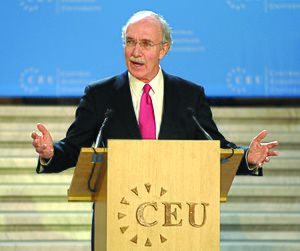John Shattuck facts for kids
Quick facts for kids
John Shattuck
|
|
|---|---|

John Shattuck, inauguration as Central European University President and Rector. November 2, 2009
|
|
| 6th Assistant Secretary of State for Democracy, Human Rights, and Labor | |
| In office June 2, 1993 – November 13, 1998 |
|
| President | Bill Clinton |
| Preceded by | Patricia Diaz Dennis |
| Succeeded by | Harold Hongju Koh |
| 3rd United States Ambassador to the Czech Republic | |
| In office October 22, 1998 – December 16, 2000 |
|
| President | Bill Clinton |
| Preceded by | Jenonne R. Walker |
| Succeeded by | Craig Roberts Stapleton |
| President and Rector of Central European University |
|
| In office 2009–2016 |
|
| Preceded by | Yehuda Elkana |
| Succeeded by | Michael Ignatieff |
| Personal details | |
| Born | 1943 (age 82–83) |
| Alma mater | Yale University Clare College, Cambridge Yale Law School |
John Shattuck (born in 1943) is an expert in international law and a leader in human rights. He was the President of Central European University (CEU) from 2009 to 2016. Today, he is a senior fellow at the Harvard Kennedy School and teaches at the Fletcher School of Law and Diplomacy.
Contents
John Shattuck's Early Life and Education
John Shattuck studied at some well-known universities. He earned his first degree from Yale College in 1965. Later, he received a master's degree in International Law from Clare College, Cambridge in 1967. He then completed his law degree at Yale Law School in 1970. While at Yale, he was an active member of the Yale Russian Chorus.
Starting a Career in Law
Shattuck began his career working for the American Civil Liberties Union (ACLU) from 1971 to 1976. The ACLU is an organization that works to protect people's rights and freedoms. From 1976 to 1984, he led the ACLU's office in Washington. During this time, he worked on important cases involving civil rights.
Working at Harvard University
From 1984 to 1993, John Shattuck worked at Harvard University. He was a vice president, helping with government and community relations. He also taught at Harvard Law School starting in 1986. He was involved in programs about science, technology, and public policy.
John Shattuck's Role in Human Rights
From 1993 to 1998, Shattuck served as the Assistant Secretary of State for Democracy, Human Rights, and Labor for the United States. This was under President Bill Clinton. In this role, he helped the United Nations create special courts. These courts were set up to try people for serious crimes in Rwanda and former Yugoslavia. He worked closely with Secretary of State Madeleine Albright.
Helping Bosnia and Herzegovina
In 1995, Shattuck was the first international diplomat to reach people who survived the Srebrenica genocide in Bosnia. He gathered important information that helped the UN Security Council decide to send NATO forces to Bosnia. He also worked with US special envoy Richard Holbrooke to help negotiate the Dayton Peace Agreement. This agreement helped end the war in Bosnia.
Ambassador to the Czech Republic
From 1998 to 2000, John Shattuck was the U.S. Ambassador to the Czech Republic. He helped the Czech government join NATO. He also helped them prepare to become a member of the European Union a few years later.
Leading the Central European University
In August 2009, John Shattuck became the fourth President of Central European University (CEU). CEU is a university that focuses on promoting open societies, human rights, and the rule of law. He also taught courses on US foreign policy and human rights.
New Programs and Initiatives
Under Shattuck's leadership, CEU started many new and exciting programs. These included studies in cognitive science and network science. The university also began a major project to rebuild its campus in Budapest, Hungary. This project was finished in 2016.
CEU's academic quality improved during his time. Its politics and international studies programs were ranked among the best in the world. CEU also received many grants for research in Europe.
Protecting Academic Freedom
One of Shattuck's main goals was to protect academic freedom at CEU. He wanted to make sure the university could teach and research freely. This was especially important as the government in Hungary became more controlling. In 2014, he started the Frontiers of Democracy Initiative. This program brought together experts to discuss what democracy means today.
After CEU
After seven years, Shattuck stepped down as CEU's President in July 2016. In his honor, CEU created the Shattuck Center on Human Rights. He became President Emeritus of CEU. He then moved to Boston. There, he became a professor at the Fletcher School of Law and Diplomacy. He also became a senior fellow at the John F. Kennedy School of Government Carr Center for Human Rights Policy.
At Fletcher, he helped start a master's degree program focused on relations between the US and Europe. At Harvard, he led a project called "Reimagining Rights and Responsibilities in the United States." This project looked at the state of rights and democracy in America. It led to a major study published in 2022.
Awards and Recognition
John Shattuck has received several honorary degrees from different universities. These include Kenyon College and the University of Rhode Island. He also received awards for his work in human rights and public service. In 2007, he was chosen to be a member of the American Academy of Arts and Sciences.
 | Aurelia Browder |
 | Nannie Helen Burroughs |
 | Michelle Alexander |

